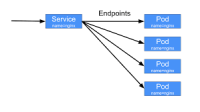What is an endpoint?
- Are you constantly hearing the term ‘endpoint’ thrown around in tech discussions but have no idea what it means? Do not worry; you are not alone! Endpoints are a critical component of modern technology, and understanding them is essential to stay on top of security and data protection. In this blog post, we will describe the nitty-gritty details of endpoints and provide an easy-to-digest explanation that even non-techies can understand. So, grab your coffee cup and get ready to learn about one of the most crucial concepts in the tech world – What is an Endpoint?”
What is endpoint security?

Endpoint security is the term used to describe the protection of network-connected devices. Computers, laptops, cell phones, and other IoT devices may fall under this category. Endpoint security is crucial since these gadgets are frequently used to access sensitive information or perform essential functions.
Endpoint encryption, firewalls, and antivirus software are a few endpoint security options. Endpoint security ought to be a component of a larger security plan that also covers user training and network security.
Security Measures for What Is An Endpoint
It will help if you implement an endpoint security plan to shield your endpoints from security risks. You have various options; the most effective one will rely on your individual requirements and environment.
The following are some typical endpoint security measures:
- Firewalls: A firewall is an essential part of any security plan. Before it reaches your endpoints, harmful traffic can be stopped.
- Antivirus: Antivirus software helps find and remove malware that slips through your firewall. By keeping the antivirus software up to date, you can easily protect your
- Patch management: Every software product needs to be maintained properly. Proper processes for patching software, including operating systems and apps, should be in place.
- Device Control: If possible, limit the use of connected devices. USB drives and other removable media are included in this. Doing this can lessen the chance that these devices will introduce malware into your network.
- User education: Educating users about sound security procedures is one of the best strategies to lower the chance of a security breach. Train children to recognise phishing emails, create secure passwords, and refrain from downloading malicious files from the internet.
The significance of endpoint security
As more devices are being connected to the internet, the necessity for endpoint security is becoming increasingly obvious. There are more options for hackers to obtain private data because so many devices can connect to the internet. Endpoint security is a method of preventing hackers from accessing internet-connected devices. By implementing endpoint security, businesses can safeguard themselves against data loss, legal responsibility, and reputational harm.
Workings of endpoint security
The defense of network-connected devices is known as endpoint security. Mobile devices, desktop computers, servers, and laptops are examples of endpoints. Endpoint security aims to safeguard these devices from being taken advantage of by hackers or harmful software.
Endpoint security can be implemented in a variety of ways. Firewalls are one method for preventing incoming traffic from potentially harmful sources. Making it difficult for hackers to access data on an endpoint device is another method to utilize encryption.
The security of the entire network depends on endpoint security. By safeguarding connected devices, businesses may lower the risk of data breaches and other cybersecurity threats.
The advantages of endpoint safety
Networked devices, including laptops, cellphones, and tablets, that are used to access business data are protected by endpoint security. It is an essential part of any all-encompassing security strategy.
The following are a few advantages of endpoint security:
- Prevents data breaches: Endpoint security solutions can stop data breaches by spotting and thwarting hostile behaviour at the perimeter.
- Prevents malware: Endpoint security solutions can prevent malware by checking devices for malicious software and deleting it.
- Increases productivity: Endpoint security solutions can increase productivity by lowering the demand for IT help and downtime by ensuring that devices are secure.
- Improves visibility: Endpoint security solutions can offer insight into all networked devices, making finding and fixing problems simpler.
The difficulties with endpoint security
Although there are many different endpoint security concerns, they can be roughly divided into three categories: technical challenges, people challenges, and process challenges.
The necessity to continuously patch and update endpoint software, the dependency on outdated systems and the difficulty of managing different endpoint security products are some of the technical difficulties. The need to educate and train users on security best practices, the difficulty in persuading users to adhere to security protocols, and balancing security requirements with user productivity are just a few of the people’s difficulties. Process difficulties include developing and maintaining specific security policies, ensuring all endpoints are configured correctly and in compliance, and tracking and quickly responding to issues.
A look into what is an endpoint’s future
Endpoint security is becoming more and more crucial as more and more devices are online. Protecting network-connected devices is what endpoint security entails. They could be computers, cell phones, or Internet of Things (IoT) gadgets.
Malware, viruses, and ransomware are just a few dangers that can target endpoint devices. These dangers can seriously harm a device or even steal private information. Because of this, it is crucial to implement a strong endpoint security solution.
Endpoint security products come in a wide range of variations. The most widely used ones are firewalls, intrusion detection systems, and antivirus software. Nonetheless, it’s crucial to pick a solution that meets your requirements.
As the number of connected devices grows, so does the need for effective endpoint security solutions. Businesses must be prepared to protect their data and devices from the ever-growing list of threats.
Endpoint Detection and ResponseThe significance of endpoint security
See Also:
